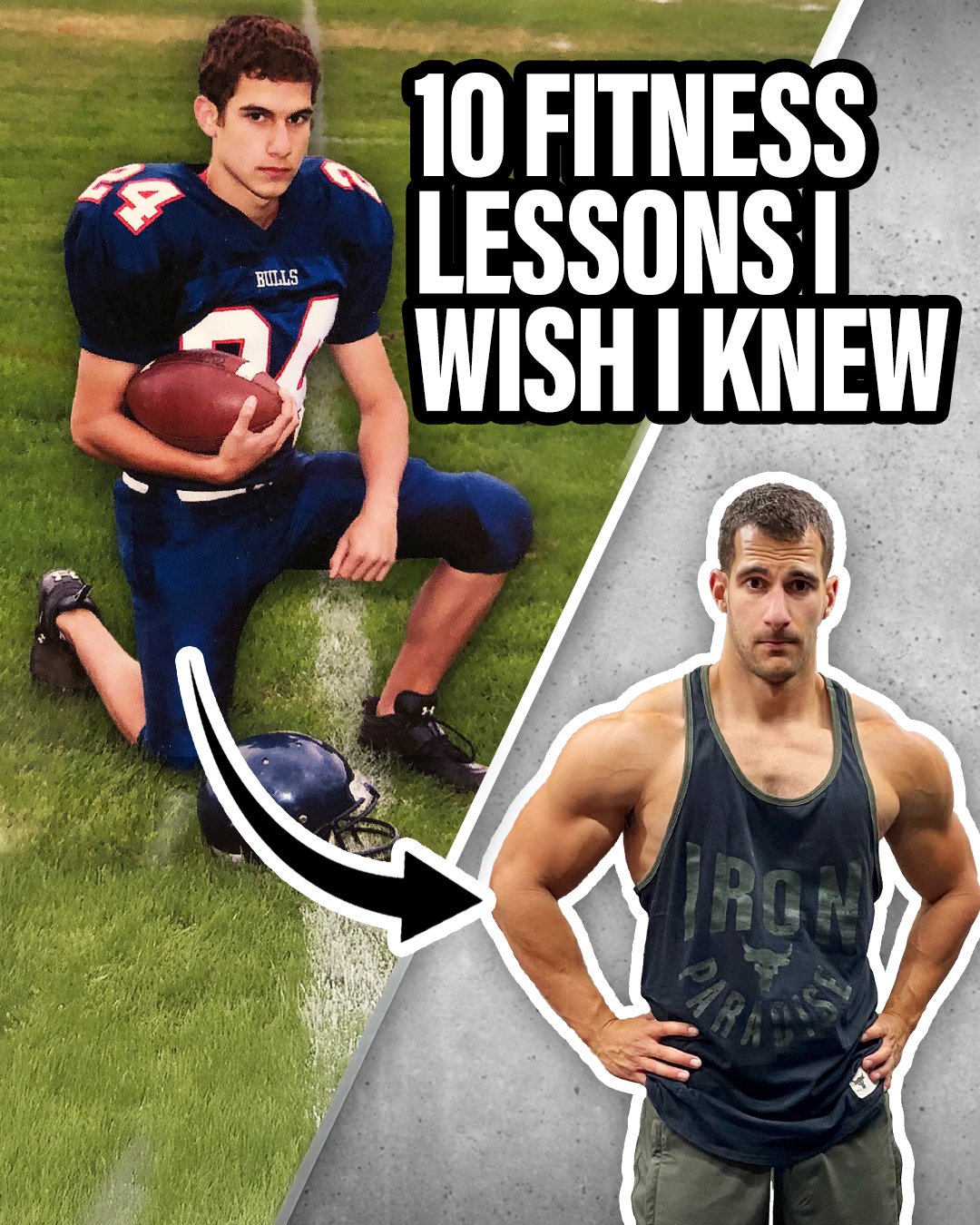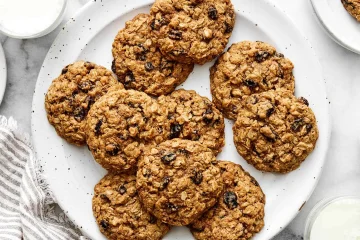I’ve spent the last 16 years obsessed with all things fitness.
If you’re new here, I run this blog where I share everything from protein-packed recipes to fast food nutrition guides, and break down fitness topics in a way that actually makes sense.
It’s absolutely insane to think I’ve been working out for 16 years of my life. I’ve gone from a clueless teenager who thought he knew everything about fitness (spoiler alert: I didn’t), to someone who’s made pretty much every mistake you can make in the gym.


If I could go back in time and talk to my teenage self, there are so many things I’d want to share about this whole fitness journey. Granted, as a teenager who knew everything there was to know about anything in the universe, there’s a 0% chance I would have listened at the time.
But in this hypothetical time-traveling situation, I’ve got to try.
When you dedicate half of your life to anything, you’re going to learn a thing or two. While it’s impossible to summarize everything I’ve ever learned about fitness, I want to share the 10 most important lessons I wish I knew when starting out.
If you’re someone who prefers listening or watching to reading, you can get all 10 lessons in my video below:
1. You Should Make Mistakes


Fitness is unique. It’s not like you’re running a race where one mistake leads to losing, or you’re climbing the corporate ladder where a mishap lets someone else overtake you.
This is just you versus you. You’re on a path that’s going to continue for your entire life.
Making mistakes doesn’t take you off that path – it’s part of the journey.
I’ve made so many mistakes in my early years of lifting (most of which I’ll touch on in this as I go through this list). I was young and dumb, and mistakes were just part of my process. Mistakes are going to part of your process, too.
As I look back on my many mistakes over the years, I don’t have any real regrets. Those mistakes led me to where I am today, and I’m really happy with where I ended up.
No mistake you make in the gym is going to be detrimental to your progress. Well, unless you suffer some kind of catastrophic injury. Try to avoid that if you can help it.
2. Focus on What You Enjoy, Not What’s “Optimal”



We’re constantly chasing what’s “optimal,” especially in the beginning. We want to find the perfect workout split, the perfect workout duration, when do perform cardio, which type of cardio… it’s a lot.
And then there’s the diet.
When should you consume protein? What’s the optimal carb-to-protein ratio? Should you have whey or casein before bed? Empty stomach cardio or post-meal workouts?
Here’s some important advice: none of that matters if it makes you miserable.
Seriously.
Sure, if you do everything optimally, you’re going to fast-track your results. But when you stretch this out over the duration of your entire life, the differences these things make are so minuscule.
Let’s take a real example. Maybe a full-body split is technically “optimal” for your weight loss journey. In a lot of cases, this is actually true.
But you absolutely hate full body workouts. It makes you dread going to the gym. You start skipping workouts. Eventually, it leads to you giving up on fitness altogether.
On the flip side, you can do things less optimally – a body part split where you dedicate one day to back, one day to chest, another day to arms, and so on. It’s not as “optimal,” but you love it.
You look forward to your workouts every day, you enjoy your time in the gym, and you stick with your program over the long term.
One of these options is clearly the better choice, and it’s not the “optimal” route.
An optimal workout means nothing if you hate it. An optimal diet means nothing if you dread every single meal. Chase what makes you happy and do the things you enjoy above all else.
3. Treat Every Muscle Equally



We all have our favorite body parts to train. That’s normal human nature.
But one of the most egregious mistakes I made early on was that if I didn’t care about a particular muscle, I just didn’t train it.
I was skipping leg day because: one, I hated it, and two, I could just wear pants so nobody would see my leg muscles.
I skipped back day because I couldn’t see my back muscles, so who cares?
Instead, I focused most of my energy on arm day for no reason other than I wanted my arms to look big. As humans, we’re vain, and a lot of people fall into this trap.
But I’m here to tell you that every single body part is just as important to train.
I know that’s nearly impossible to convince any beginner (trust me, I wouldn’t have listened either). But skipping the important lifts in my early years totally set me back.
My legs are still underdeveloped compared to the rest of my body. My squat has been historically weaker than my bench press, and that should not be the case when you consider the fact that your leg muscles are a significant percentage of your overall body mass compared to chest muscles.
I would be so much stronger overall if I had focused more on squatting and deadlifts instead of preacher curls and forearm training. Take it from me: don’t neglect bodyparts simply because you don’t enjoy training them.
4. Supplements Don’t Matter



I’m saying this as someone who is a sponsored athlete and works closely with a big supplement company – they really don’t matter that much.
We tend to forget that by definition, a supplement is something we are supplementing our diet with. Not something we should be relying on.
Protein powder? It’s great. I have plenty of protein powder supplements. It’s a convenient way to get extra protein into your diet, and I love using protein powder in tons of recipes.
But you do not need a protein powder supplement. If you’re getting enough protein in your diet from food, a protein supplement will make zero difference.
That “anabolic window” you’ve probably heard about, where you need to drink a protein shake within 30 minutes after your workout? Supplement companies made that up to get you to buy protein powder. As long as you’re consuming enough protein throughout the day, chugging a protein shake immediately after your workout is not going to make a difference.
This is not to say supplements are ineffective or that you should avoid them. I take creatine. I take pre-workout. But those things are not necessary for results, especially in the long term.
Pre-workout is obviously a quick energy source, which is great for busy schedules or early mornings. Plus, the pump and focus it gives you can really help your workouts. Creatine is well-researched and will absolutely help your overall strength and energy.
But again, in the grand scheme of life, the differences these supplements make are not all that big at all.
Supplements are one of those things that if you can afford to buy them, by all means take them. They are very convenient. But please do not rely on them.
5. Take Progress Photos



One of the things I beat myself up about is that early on, I did not take progress photos of myself.
When I did take photos, they were just post-workout snapshots in the mirror at the gym with good lighting and good angles so I’d look my best. That’s not an indicator of progress.
I want to be able to look back and actually see the progress I’ve made year-over-year.
Progress photos are so importnt because we are our own worst critics. We see ourselves through a really skewed light, and what we see is usually not what the rest of the world sees.
If you’re only basing your progress off of what you perceive you look like, you’re never going to think you’re actually making progress.
It’s when you can look back and see the photos and the true physical differences that you notice the incredible progress you’ve made.
So many times you’ll feel like you’re not making progress, and when you see those photos, it will be all the motivation you need to keep going.
For the longest time, I didn’t take photos because I was so embarrassed that people would see shirtless photos of myself in the mirror if they got in my camera roll. But when you think about it, that should not matter in the slightest.
You’re not taking photos to show off- you’re taking photos to document your progress to continue to better yourself. And it is so worth it.
6. Nobody Cares if You Have Abs



I’m talking to every teenage guy out there that wants the chiseled movie star abs: nobody cares.
Do you know who remembers whether or not I had a six-pack in high school? Nobody. Absolutely nobody.
Every single year, I would cut weight in the spring leading up to summer so that I would have visible abs for one week of vacation over the summer. I would starve myself and take fat burning supplements to get as thin as possible so you could see my abs for my vacation.
Did it work? Technically, yes, you could see ab muscles. But at the end of the day, it was just for a photo op.
Now, many years later, it means absolutely nothing.
All that caring about my visible abs did for me was stall my overall progress.
Instead of continuing to build muscle year-over-year, I would build muscle for a few months at a time and then cut weight for just as much time, basically offsetting everything I was trying to do.
Sure, I was building some muscle in the progress, but by cutting – by reducing my calories so low – I was just stalling my strength and hypertrophy progress. And this went on for years.
It’s so common for people to want to endlessly bulk and cut, but you need to focus on building muscle for an extended period of time before you worry about cutting weight to reveal your six pack abs.
Visible abs are great. But I promise you, nobody cares whether or not you have a six pack.
If you want to build muscle, you need to be okay with carrying around a little extra fat.
Just because you don’t have a chiseled movie star six-pack doesn’t mean you’re not in great shape. Realistically, no beginner is going to have visible abs all year round. And nobody cares if you do. Seriously.
7. Don’t Try to Hit PRs Every Workout



It’s great if your goal is to get stronger, but proof of being stronger does not just mean a one-rep max.
My mindset early on was that if my bench press wasn’t increasing every week, I wasn’t making progress.
The only reason to test a one-rep max (unless you’re competing in powerlifting) is so that you can answer the question “how much you bench, bro?” Otherwise, you don’t need to know your absolutely maximum lift every single week.
There are plenty of indicators of progress aside from a one rep max.
Here’s an example: if you’re deadlifting and you go to lift 405 pounds, it might be a struggle, but it ends up being a successful lift.
Now you can either increase the weight and see where you hit absolute failure, or you can stick with your program for a few more weeks.
At that point, maybe you try 405 again and it feels much easier, so you end up completing three total reps.
Not only did the weight become easier, but you were able to lift it more than once. Clearly you have made progress and gotten stronger without testing your 1 rep max!
You can test your max every once in a while if you really want to, but don’t overdo it.
8. Cardio is Not Just for Fat Loss



I avoided cardio like the plague early on because I was told if you want to build muscle, you can’t be a runner.
I remember seeing photos of sprinters and long-distance runners and noticing how much thinner the long distance runners were. My conclusion was that if you wanted to build muscle, you couldn’t run long distances.
But those two things are not mutually exclusive. Long-distance running and sprinting simply require two very different training styles.
Just because somebody likes running long distances doesn’t mean they can’t build muscle. It just means it’s not their focus- running long distances is.
I know it’s hard to believe, but cardio is good for… your cardiovascular health! In the long run, your lungs, heart, and mind will all be better off if you incorporate movement in your life outside of lifting weights.
I’ve since come to my senses. I love doing cardio now, and I don’t do it on a structured level where I go out for a run every day, but I’m very active.
I have a toddler that I chase around and a dog that needs walks, so I end up walking five or six miles every single day. And through that, I’m still able to make strength and muscle gains.
If you want to build muscle, you do need to be in a calorie surplus. So if you’re running or doing some form of cardio, yes, that’s going to make it a little bit harder. But all that means is you need to eat a little bit more!
It doesn’t mean that doing cardio is going to completely offset all of your hard work in the gym.
Cardio is very important for everybody to do in one form or another. I don’t care if it’s steady state, I don’t care if it’s high intensity, I don’t care if it’s not structured where you’re just going for a walk around the mall.
Some form of movement outside of just lifting weights is very beneficial.
9. Take Time Off, You Idiot



When you’re young, you’re indestructible. You don’t have to warm up. You don’t have to ease into things. You don’t have to take any time off. None of it matters because you’re never hurt.
Early on in my lifting, I employed a no-days-off mentality where I worked out seven days a week.
And honestly? I felt fine.
I vividly remember thinking “Why do people take so much time off?” It seemed like I was just tougher than everybody else. I was seeing results, so what did they know?
I was so messed up in the head that I would take one day off and then the next day I’d be doing the “ab check” in the mirror to see if I’d gotten fat after one day of not lifting.
That’s how screwed up the “no days off” mindset made me.
I’m really lucky I didn’t suffer any kind of major injuries or setbacks, because your body needs to rest and recover. Had I allowed my body to recover in the early years, there is no doubt my progress would have accelerated.
I currently workout 5 days per week and I make it a point to take every single weekend off.
Occasionally you’ll reach points where it’s just hard to get into a groove, your workouts start struggling, and you don’t look forward to the gym.
In those times, that’s when I decide I’m going to take a full week off. A week sounds like a long time, I know, but the mental reset, combined with the physical rest, is an incredible thing.
After a full week, I am itching to get back into the gym, and I always feel great.
There’s no hard set rule of how much time you need to be taking off – it’s different for everybody. But the minimum should be 2 days off every week.
And if you can’t allow yourself to take off a full week for vacation or holidays or whatever it is – if that thought of taking a week off makes you feel like you’re going to lose all of your progress – that’s when you need to re-evaluate your approach.
I am here to tell you I used to be in that position, and that is a really screwed up mentality to have.
You need to allow yourself to rest. You need to enjoy time away from the gym.
Trust me, your body (and mind) will thank you in the long run.
10. Don’t Be Afraid to Let Go of Your Fitness Goals



I saved the most important lesson for last.
Giving up on your fitness goals does not make you a failure.
Now, I’m going to say it again because it’s important: giving up on your fitness goals does not make you a failure.
I used to care about my max lifts more than anything. All I cared about was increasing my max bench press as much as possible.
All the programming I did was ultimately to bench as much as possible. I had a grand goal of benching 400lbs at one point, but the most I ever got to was 385.
I never quite hit that goal I set for myself, but then I got to a point where I just stopped caring about how much I could bench.
At this age, at this stage of my life, pushing myself to a one-rep max is just not important to me anymore. So I gave up on that goal of benching 400 lbs, knowing full well that I would never hit that goal.
Does that mean that I failed? No, it just means that my life changed and my goals changed.
Your goals are going to change as the years go on, and you need to be willing to accept that.
Building as much muscle as possible might be the goal right now, but as you grow older, you might really get into mobility training, and that becomes the most important thing for you.
That pivot doesn’t mean you failed anything – it just means your life changed.
Or you might take up running, and improving your run times are going to be more important than your max squat.
Your goals will change because our lives change. We grow older, our careers change, we become parents, we form new relationships, we experience hardships.
Life is going to throw a lot at you, and you are going to change. So it’s only natural that your goals are going to change, too.
Even if you never reach this goal that you have set for yourself, it’s okay to pivot. It doesn’t mean you’re a failure.
It just means you’re human.
What Are Some Lessons You Would Add?
There are countless other fitness lessons I could add to this list, but if I continue to write them out, this post will be 50,000 words long.
So while this doesn’t encompass everything I’ve learned on my fitness journey, these lessons would have put me in a much better position 16 years ago.
What would you add to this list? What lessons have you learned along your fitness journey? Let me know in the comments below!








